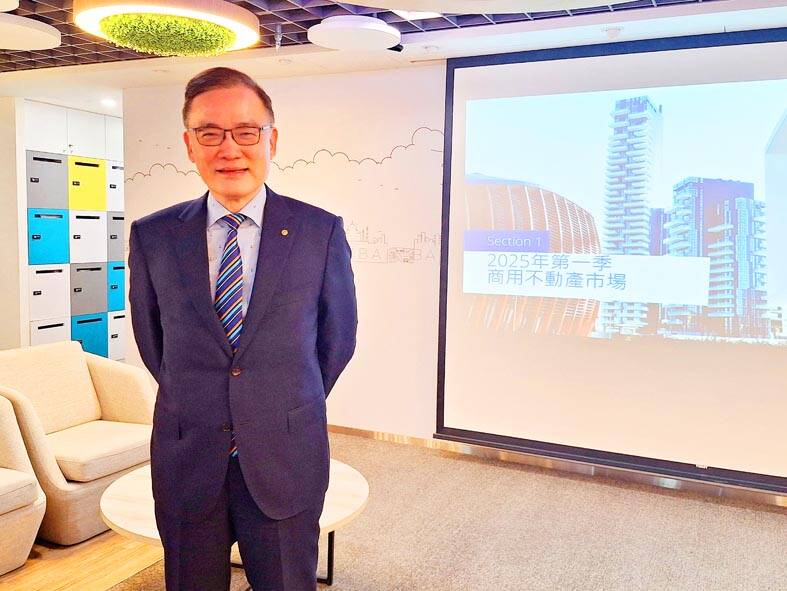Commercial property deals totaled NT$28.7 billion (US$882.29 million) last quarter, slumping 37 percent year-on-year, as global economic uncertainty and lingering credit controls in Taiwan chilled the market, Colliers International Taiwan (高力國際) said yesterday.
“Unclear US tariff policies are driving manufacturers to reassess their global presence and production base locations, with the possibility of postponing expansion or investment plans,” Colliers Taiwan senior research director Eilleen Liang (梁儀盈) said.
Owner-occupiers underpinned commercial real-estate deals during the January-to-March period, as companies such as Uni-President Group (統一企業), Micron Taiwan (美光), ASMedia Technology Inc (祥碩科技) and Wendell Industrial Co (穩得) bought properties to bolster their operations, the company said.

Photo: CNA
Micron Taiwan has purchased its third property for self-occupancy since August last year, it said.
Demand for capacity expansion and workspace upgrades was a key driver of factory and industrial office transactions, explaining why firms from the electronics, integrated circuit design and semiconductor sectors purchased properties, the company said.
As a result, factories and logistics warehouses were the most sought-after, accounting for NT$12 billion of deals, followed by industrial offices at NT$9.2 billion, it said.
Meanwhile, investment-focused activity was quiet, with no transactions from domestic life insurance companies at all, it said, adding that financial regulators had lowered the minimum return.
As for land deals, major Taiwanese developers continued to acquire land in popular locations, especially in southern Taiwan, the company said.
Farglory Land Development Co (遠雄建設) spent NT$13.6 billion to build up land stock in Kaohsiung, while JSL Group (甲山林) acquired land and old idle factories for development, it said.
Looking ahead, Colliers Taiwan said property investors should take time to re-evaluate their portfolios and bolster their resilience in dealing with market direction shifts.
As borrowing costs remain high, owner-occupiers would continue to dominate transactions of factories and industrial offices, the company said.
Companies would cautiously approach expansion plans and slow the decisionmaking process, which is unfavorable for property transactions, it said.
The central bank last month cut its forecast for the nation’s GDP growth to 3.05 percent for this year, and growing uncertainty linked to US tariffs might merit further revisions, the company said.
The US trade policy is rattling consumer and property market confidence across the world and would weigh on property investment in Taiwan, it said.
In related developments, construction loans last month stood at NT$3.43 trillion, or a 2.97 percent rise from a year earlier, marking the slowest advance since August last year, the central bank said yesterday.
The slowdown has to do with developers’ conservative attitude in dealing with the central bank’s credit controls, it added.
Likewise, house loans picked up from the lowest pace of 9.34 percent in nearly a year to NT$11.18 billion, as credit controls drove some buyers to the sidelines, it said.

In Italy’s storied gold-making hubs, jewelers are reworking their designs to trim gold content as they race to blunt the effect of record prices and appeal to shoppers watching their budgets. Gold prices hit a record high on Thursday, surging near US$5,600 an ounce, more than double a year ago as geopolitical concerns and jitters over trade pushed investors toward the safe-haven asset. The rally is putting undue pressure on small artisans as they face mounting demands from customers, including international brands, to produce cheaper items, from signature pieces to wedding rings, according to interviews with four independent jewelers in Italy’s main

Japanese Prime Minister Sanae Takaichi has talked up the benefits of a weaker yen in a campaign speech, adopting a tone at odds with her finance ministry, which has refused to rule out any options to counter excessive foreign exchange volatility. Takaichi later softened her stance, saying she did not have a preference for the yen’s direction. “People say the weak yen is bad right now, but for export industries, it’s a major opportunity,” Takaichi said on Saturday at a rally for Liberal Democratic Party candidate Daishiro Yamagiwa in Kanagawa Prefecture ahead of a snap election on Sunday. “Whether it’s selling food or

CONCERNS: Tech companies investing in AI businesses that purchase their products have raised questions among investors that they are artificially propping up demand Nvidia Corp chief executive officer Jensen Huang (黃仁勳) on Saturday said that the company would be participating in OpenAI’s latest funding round, describing it as potentially “the largest investment we’ve ever made.” “We will invest a great deal of money,” Huang told reporters while visiting Taipei. “I believe in OpenAI. The work that they do is incredible. They’re one of the most consequential companies of our time.” Huang did not say exactly how much Nvidia might contribute, but described the investment as “huge.” “Let Sam announce how much he’s going to raise — it’s for him to decide,” Huang said, referring to OpenAI

The global server market is expected to grow 12.8 percent annually this year, with artificial intelligence (AI) servers projected to account for 16.5 percent, driven by continued investment in AI infrastructure by major cloud service providers (CSPs), market researcher TrendForce Corp (集邦科技) said yesterday. Global AI server shipments this year are expected to increase 28 percent year-on-year to more than 2.7 million units, driven by sustained demand from CSPs and government sovereign cloud projects, TrendForce analyst Frank Kung (龔明德) told the Taipei Times. Demand for GPU-based AI servers, including Nvidia Corp’s GB and Vera Rubin rack systems, is expected to remain high,